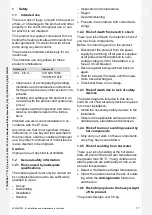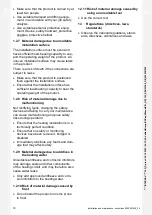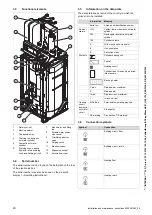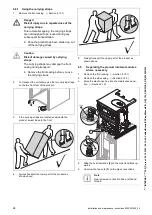
*****INTERNAL*****30 R_D proof- 26.10.2022 / 09:15:46- VaillantGroup\DOC-agt\Brand\VIH_QW_190_6\ENG\OI-II_GB_0020291525
30
Installation and maintenance instructions 0020291525_04
1
6
4
5
2
3
1
Cold water with equal
pressure
2
15 mm diameter con-
nection, e.g. potable
water expansion vessel
3
22 mm diameter con-
nection, e.g. potable
water expansion vessel
4
Pressure reducer
5
Cold water supply
6
Expansion relief valve
1.
Before installation, flush the pipes in order to clear any
contamination and prevent the build up of dirt.
2.
Install the safety assembly horizontally and install the
expansion relief valve so that it is facing upwards.
3.
Note the flow direction, which is specified by an arrow.
4.
Connect the safety assembly to the drain valve. Con-
sult the table below to find out the length to which the
pipe should be cut.
Size of the
cylinder
Length of the pipe
that has a diameter
of 22 mm
Pre-charge pres-
sure of the expan-
sion vessel
200
900 mm
0.3 MPa
(3.0 bar)
5.
Install a pipe between the safety assembly's connec-
tion and the product's temperature and pressure re-
lief valve. Use a T-piece for this. The pipe system must
continuously slope downwards, must be visible and
must be protected against frost. There must be no risk
of injury to persons.
–
Diameter of the pipe: 22 mm
–
Length of the pipe between the temperature and
pressure relief valve and the expansion relief
valve.:
≤
600 mm
6.
Connect the cold water supply to the safety assembly.
–
Diameter of the cold water supply pipe:
≥
22 mm
7.
Ensure that no valve will be fitted between storage
cylinder and expansion valve.
8.
Install the potable water expansion vessel form the
bag of small parts either on the rear of the product
(option A) in accordance with the enclosed installation
instructions or to one of the two free connections for
the safety assembly (option B). Adjust the pre-charge
pressure in accordance with the drinking water system.
5.6.2
Installing a drain pipe
≤ 600 mm
≥ 300 mm
D2
2
1
D1
1
Temperature and pres-
sure relief valve
2
Tundish
Discharges at high level: e.g. into metal hopper and metal
downpipe with the end of the discharge pipe clearly visible
or onto a roof capable of withstanding high temperature dis-
charges of water and 3 m from any plastic guttering system
that would collect such discharges. The discharge would
consist of high temperature water and steam. Asphalt, roof-
ing felt and non-metallic rainwater goods may be damaged
by such discharges.
The drain connections of the temperature and pressure re-
lief valve and the expansion relief valve must be connected
to the supplied tundish via 22-mm-thick copper pipes. The
tundish must be installed vertically, as close to the cylinder
as possible and with a maximum clearance of 600 mm from
the connection of the temperature and pressure relief valve.
It must be installed in the same room as the cylinder, but at
a sufficient distance from electrical components. The drain
pipes from the temperature and pressure relief valve and
from the expansion relief valve can be connected above the
tundish using a T-piece. The drain pipe from the 28 mm con-
nection of the tundish must consist of copper pipes with a
diameter of at least 28 mm and be connected to a safe and
visible drainage point. The vertical section of pipe beneath
the tundish must be at least 300 mm long before any bends
or diversions in the line. If the total resistance of the drain
pipework exceeds the values in the following table, you must
increase the diameter of the pipework.
Any discharge should be visible at the tundish. In addition,
where discharges from safety devices my not be apparent,
e.g. in dwellings occupied by people with impaired vision or
mobility, consideration should be given to the installation of
a suitable safety device to warn when discharge takes place,
e.g. electronically operated.
When installing the drain pipework, comply with the stand-
ards, directives and laws that are applicable in your country.
















































